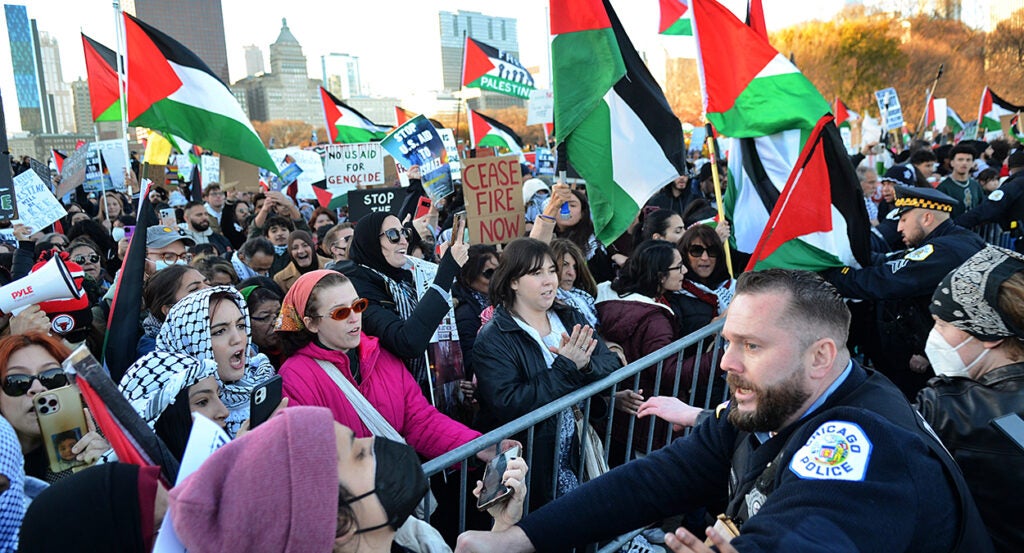The Lancet, one of the world’s oldest and most influential medical journals, agreed to publish an open letter signed by more than 3,000 physicians and demanding actions that would undermine Israel’s ability to protect itself from another Oct. 7-style terrorist attack. The letter also framed Israel’s response to the massacre of its citizens as an attack on “human rights.”
A few weeks after the letter received stiff criticism, The Lancet appears to have reconsidered.
“This is a copy of the letter titled ‘A Call to Action: An Open Letter from Global Health Professionals’ as it was to appear in an academic journal,” reads a note on the document. “Following acceptance and copy-editing by the journal, the decision to publish was rescinded.”
The Lancet did not respond to The Daily Signal’s request for comment on why it accepted and then ultimately rejected the letter.
The journal revoked plans to publish the letter after Ian Kingsbury, director of research at the medical organization Do No Harm, and Jay Greene, a senior research fellow at The Heritage Foundation’s Center for Education Policy, condemned the letter in a Daily Signal op-ed last month.
“The editors would’ve been fully aware of the letter’s content when they accepted it for publication, so it’s unlikely to be the case that they suddenly found that content objectionable,” Kingsbury told The Daily Signal in a statement Friday. “It’s more likely that they felt pressure over the public outrage that was rightfully brewing around the letter.”
Kingsbury noted that The Lancet published a similar anti-Israel open letter back in July 2014, and the authors of that letter went on to promote former Ku Klux Klan leader David Duke.
“The editors know from experience that, thankfully, much of the public finds their views about Jews and Israel objectionable,” he added.
As Greene and Kingsbury noted, the letter acknowledged that Hamas killed 1,400 Israelis (a revised estimate puts the number around 1,200), mostly civilians, on Oct. 7, but it immediately made demands of Israel without doing so for Hamas. The letter demanded “an immediate cease-fire in Gaza,” “the immediate flow of essential supplies and other humanitarian support into Gaza,” and “protections against the destruction of all critical infrastructure and objects indispensable to the survival of the civilian population, including but not limited to hospitals and other [centers] delivering health care services.”
The letter nowhere acknowledged the fact that Hamas intentionally stations military equipment in civilian buildings, such as hospitals and mosques, using civilians as human shields. While it sounds noble to demand the protection of hospitals, such a demand arguably protects Hamas at the expense of Israel’s military objective of destroying Hamas to prevent another Oct. 7 pogrom.
Similarly, the letter called for “the lifting of the siege in Gaza” and “the recognition of the human rights of all people in the region, including the right to health, access to water and food, and immediate action to uphold these rights.” The letter did not acknowledge that restricting materials into Gaza helps Israel’s military efforts to starve and destroy Hamas, nor that Israel has repeatedly urged Gazans to leave and sought to facilitate their escape while Hamas has acted to prevent it.
The letter repeatedly framed the inhabitants of Gaza as victims and Israelis as oppressors. It “contextualized” Oct. 7 by stating that the terrorist attacks “occurred in the context of the decades-long occupation of the Palestinian territories.” It urged “the end of colonialism” and condemned “violence against Indigenous peoples globally,” implying that the residents of Gaza somehow represent an indigenous people. It stated: “We share the call for ‘unconditional humanity’ in Gaza and to guarantee health through peace.”
The Israel Defense Forces strives to exceed the requirements of the law of armed conflict, while Hamas intentionally puts Gazan civilians in harm’s way. The IDF warns civilians before carrying out rocket strikes by dropping leaflets and even making phone calls in advance. Meanwhile, Hamas tells civilians not to flee and has even shot civilians attempting to leave Gaza City.
According to Greene and Kingsbury, an early version of the open letter included a demand for the “immediate and unconditional release of all hostages.” The letter’s authors removed that commonsense demand “based on debate and feedback.”
While The Lancet appears to have ultimately rejected the letter, 3,444 physicians had signed it (as of the latest update to the signatory list on Nov. 2), and the prestigious medical journal tentatively accepted it. Would the journal accept a call for a cease-fire in Luhansk and Donetsk, regions of Ukraine currently occupied by Russia?
Have an opinion about this article? To sound off, please email letters@DailySignal.com, and we’ll consider publishing your edited remarks in our regular “We Hear You” feature. Remember to include the URL or headline of the article plus your name and town and/or state.
